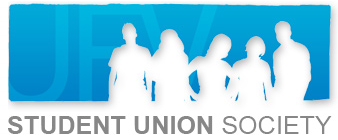By Jessica Wind (The Cascade) – Email
Print Edition: October 3, 2012
Somewhere between the circular arguments and distracting restaurant noise, SUS’s Annual General Meeting managed to come to some agreements. Of course, this was a second attempt.
VP internal Greg Stickland addressed the room as official chair of the meeting, a role normally filled by SUS president Carlos Vidal.
His absence was missed during the drawn-out debate as to whether or not board members should be allowed to disagree with the opinions of the SUS board after a motion has been decided upon. We were already two hours into the meeting when this, the third motion, was brought to the table and it had every non-board member student looking around wondering what it had to do with them.
After an uncomfortable display of unprofessional sarcastic quips between VP finance Samuel Broadfoot and former SUS board member, Mehtab Singh Rai, rep-at-large Jay Mitchell, who has served on the board for four years, called a point of order and the microphone was passed back to Stickland.
I suppose it wouldn’t be an AGM without some excitement.
During a motion that had everyone in attendance debating the technicalities within the SUS bylaws, fourth year English major Samantha Lenz motioned to amend the 75 per cent majority vote needed on the SUS board in order to push through a referendum to 50 per cent plus one and was seconded by Heidi Luhmert.
This launched a debate about how much power SUS has to make decisions, which careened off topic quickly, with people requesting a smaller percentage for student petitions. It had already been decided that students can push through a referendum on their own with a petition containing signatures from five per cent of the student membership.
Despite Stickland’s attempts to control the room and the amount of amendments being proposed, one on top of the other, the debate went on for 40 minutes before a call to action was requested.
Of course, by that point, no one knew what we were voting for anymore.
SUS now needs a board majority vote of 66 per cent to push through referendums and students may push through referendums with a petition containing the signatures of one per cent of the membership (about 160 students).
Prepare yourself for an onslaught of referendums based on these numbers – it’s easier than ever to have your voice heard on this campus. However, the shining moment for the meeting was the one we’d all been waiting for: the motion to increase SUS membership fees.
Stickland read out the motion, put forward by VP social Chris Doyle and everyone held their breath for another long-winded debate. However, before Doyle was given the opportunity to open the speaker’s list, VP academic Dan van der Kroon proposed a call to action, the vote was counted and the motion stricken from the table without consideration.
It happened so fast that there was barely time to realize that the room had publicly silenced Doyle. Had he lashed out, it wouldn’t have been the first time that procedure had been ignored to force a point that afternoon. Instead, he quietly stepped outside as the meeting continued.
The motion didn’t propose a direct fee increase, but rather a request for referendum; it was a diplomatic request at its core. I can’t honestly say how I would have voted for the fee increase, had we been given the chance to approve or deny the referendum, but it would have been nice to hear the reasoning. Of all the motions on the agenda, why is it that that one was the one robbed of a debate?
I would like the hour back that we spent debating the Trades Rep position (and whether to call it CEP or Chilliwack Rep) and give it to something that directly affects each and every student on this campus. Of course, considering the revised bylaws, we may see this membership fee referendum yet. After all, 160 student signatures, or two-thirds of the SUS board is a far more achievable number.


